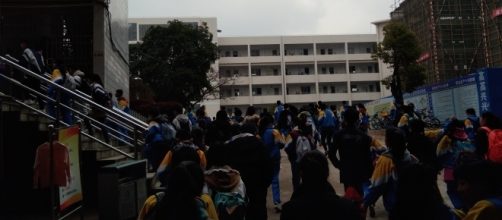A 6am rise to be in through the iron gates for 7, knowing it will be a tiring 11 hours before the day's work finishes mid-evening. The thing is, it will not even finish then. The amount of work to take home will result in little free time to enjoy before seizing whatever opportunity there is to sleep before dragging the weary body back in the following morning. Back into the cold, bleak complex where another days’ worth of information is soullessly drilled into tired brains, and any lapses into sleep on the desk could be interrupted by a sharp slap on the back of the head.
What am I describing here? A history book's account of the working life during the industrial revolution? The way things were in mining towns before trade unions began to have their say? Alas, neither. The above paragraph refers to the plight of Chinese schoolchildren, not in the bygone Dark Ages, but in the here and now of 2017.
Rough treatment
While China strives to be seen as the world's rising superpower, it lags behind in many respects. Nowhere is this clearer than in the education system, so Outdated that it shocks my innocent Western eyes. Upon starting my new job last September, teaching English in a small city in Jiangxi province, having 70-80 students all piled into one class took some getting used to.
As did the sheer amount of time these burdened 12-year-olds spend in School, coming in for the majority of the weekend as well as the lengthy weekday shifts.
Another gaping hole in the everyday running of schools over here is the complete lack of attention shown towards disabilities. Mentally disabled children are left sitting clueless as the content of the lesson rushes on at a pace they cannot keep up with, with no allowances made and no aid provided.
The most horrifying thing of all is the way teachers treat their students. Rote learning seems to exclusively predominate, and incorrect answers are met with personal insults, accusations of stupidity and even a ruler across the back of the hand.
Constant competition
Sometime living here reveals that the root of the problems in Chinese education, and the biggest obstacle to progression from them, lies in a major flaw that pervades Chinese society in general: It is all about results. Everything is a competition here, the grades of the students decides the teacher’s salaries. Parent/teacher meetings involve an entire class' worth of parents cramming into a room together where the teacher reads out every student's results for all to hear, thus encouraging parents to view their child's marks in comparison with those of other people's children.
As for the ramifications of such a cut-throat, authoritarian school life, they can be seen in the nation's everyday happenings.
Pushing and shoving are the constant norm in the streets here, as every man, woman, and child fights to get ahead of the pack. Building work never seems to cease, but nor does the amount of people living in squalor or on the streets, suggesting a tendency to blindly rush forward without much thought as to how to really make changes for the better.
Briefly, the issue is this: Chinese children aren’t taught to think but to memorise and obey. The adults that shape today's society are the products of this short-sighted method. To overcome the poverty and the crippling work-life imbalance that blight this country, it could well be in education that the first changes should occur.

